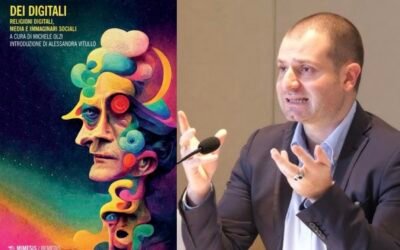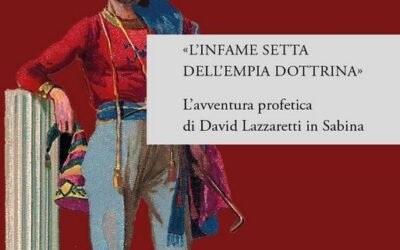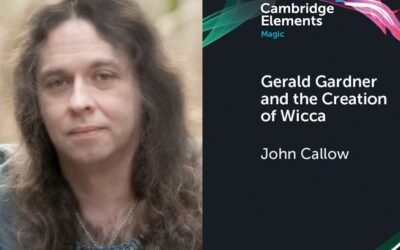A controversy continues between scholars affirming and denying Ilyin’s crucial influence on Putin. Perhaps his influence is different than many believe.
by Massimo Introvigne

Ivan Ilyin (1883–1954) is a name we are reading in these days in daily newspapers and mainline electronic media. We read that, while Eurasianist Aleksand Dugin is busy self-promoting himself as Putin’s alleged intellectual inspirer, in fact the Russian President is much more influenced by Ilyin, a philosopher who died in 1954 and was almost forgotten until Putin started quoting him. Putin personally supervised the repatriation of Ilyin’s remains to Russia from Switzerland, where the philosopher had died in exile, and presided at their reburial in Moscow. The 2015 propaganda documentary on Putin directed by Nikita Mikhalkov also insisted on Ilyin’s influence.
Putin’s references went almost unnoticed in the West, until in 2018 Yale historian Timothy Snyder wrote an article in The New York Review of Books claiming that Ilyin’s religious fascism was essential to understand the politics of the Russian President. Snyder’ s theory did not go unchallenged. Another well-known scholar of Russia, The George Washington University’s Marlene Laruelle, answered Snyder by claiming that Ilyin’s importance as a source of Putin is not crucial, and that those really influenced by Ilyin are part of one among different factions of Putin’s supporters, the one closest to Patriarch Kirill. Director Mikhalkov, Laruelle wrote, is himself part of this faction, so his references to Ilyin in the documentary on Putin are not surprising. With the invasion of Ukraine, the controversy moved from specialized to general media.
There is one point on which Laruelle is right. Apart from its importance, crucial or otherwise, Ilyin’s influence on Putin cannot be used to attack the Russian President by attributing to him Ilyin’s sympathy for Benito Mussolini (1883–1945) and, at least until the mid-1930s (he moved from Germany to Switzerland in 1938), for Adolf Hitler (1889–1945). On the contrary, Putin constantly insists on the mythology of the Great Patriotic War, i.e. World War II, and Stalin’s (1878–1963) key role in defeating the Nazis. Ironically, Ilyin himself popularized the use of the expression “Great Patriotic War,” but for him it was the Russian war against Napoleon (1769–1821). Putin would never use the word “fascism” with positive connotations, as Ilyin did, although by the end of his life he regarded Francisco Franco (1892–1975) or António de Oliveira Salazar (1889–1970) as more believable embodiments of “good” fascism than Hitler.

Ilyin’s mythologization of the Russian White Army who fought against the Bolsheviks as “God’s own army” is a different matter. Just as he repatriated and reburied Ilyin’s remains, Putin also took to Moscow and reburied with great honors the body of the White leader General Anton Denikin (1872–1947), who had died in 1947 in the United States. Although he has rehabilitated Denikin, Putin has stopped short of embracing Ilyin’s position that in the Russian civil war the Whites represented the site of God and the Reds the site of Satan. Putin’s position corresponds more to a significant scene in the celebrated 2008 Russian movie “The Admiral,” directed by Andrei Kravchuk. After one of the Whites’ last desperate battles, Orthodox priests come to bury the dead. One priest asks another whether they should also bury the atheist Reds, rather than the Christian Whites only. The answer is that they should all be buried together. White or Red, since they were all sons of Mother Russia.
Finally, Ilyin was a monarchist, and more than a nostalgic one. He theorized that only monarchy will guarantee in Russia a third way government, somewhere in the middle between corrupted western democracies and the excessively authoritarian form of fascism Hitler ended up embracing. Putin has several monarchists among his close friends and political associates, but does not dream of restoring the Czarist monarchy. For him, one Czar in the Kremlin is enough, and his name is Vladimir Putin.

But all this, I believe, does not mean that Ilyin’s influence on Putin is not real, or is unimportant. Perhaps the debate has focused excessively on the word “fascism.” As an Italian, I am reluctant to use the word “fascism” to describe phenomena far away from the original Italian movement, but in the case of Ilyin he used the word himself. More important than he admired Mussolini is the fact that “fascism” for Ilyin was an ideal category, referred to a political system that privileged spiritual over materialistic values, and hierarchy over democracy. If we take away the word “fascism,” we find the apology of the same system among many Russian ideologists and leaders, including Putin.
On this, Ilyin would not even be particularly original. However, there are other features of his thought that have been rarely discussed in the Western debate about Ilyin, although they have received more attention in Russia. For Russian historians of philosophy, Ilyin is not an obscure character. He is the most influential Russian non-Marxist philosopher of the 20th century. Many Russian interpreters of Ilyin focus on his highly technical works on Georg Wilhelm Friedrich Hegel (1770–1831), which consecrated him as a leading philosopher. However, increasing attention is being paid to his more political writings, the one Putin, who is not a philosopher and lacks the tools to appreciate Ilyin’s approach to Hegel, is referring to in some of his speeches.
There are two features of Ilyin’s philosophy that may appeal to Putin, his views of Russia and of the enemies of Russia. A key concept for Ilyin is fatherland, as he explained in the 1922 speech “The Fatherland and Us,” delivered in Germany in 1922 just after he had been expelled from Soviet Russia and deported on one of the infamous “philosophers’ ships.”

Each of us, Ilyin said, has three fathers in increasing order of importance: our biological father, our spiritual father in the (Orthodox) Church, and God. The fatherland is defined by the combination of these three relationships. Since the spiritual relationships are more important, where we physically are is less crucial than where our spirit is. As he wrote in 1926 in “The White Idea,” the Russian White emigres had carried Russia with them and could be more Russian in Berlin or Paris than Stalin was in Moscow, since they had a “spiritual Kremlin” in their hearts.
By the time he collected lectures of 1926 and 1927 in “Three Speeches on Russia,” published in Sofia in 1934, Ilyin had re-introduced in the concept of fatherland a territorial element, defined as the areas reached by Russian “ancient national culture and marvelous language.” Parenthetically, he took a stand against any idea of Ukrainian independence, but he was certainly not the only émigré thinker to do so. By meditating on the Great Patriotic War, which as mentioned earlier for him was the war against Napoleon, he described Russia as a Christ-like nation which periodically passes through cycles of self-sacrifice, death, and resurrection. Russia is on the side of God, and “there are only two paths open to humans in an age of revolution, toward God and against God.” By saving itself and returning to its past glory (and territory) Russia will save humanity as a whole. Ilyin also wrote about chivalry, and fantasized about a new order of chivalry that would embody Russian values and take them to the world.
But this project, Ilyin believed, was not without obstacles. Certainly he saw the Bolsheviks as evil, but they were not the only enemies of Holy Russia. Attention is being paid in Russia to the fact that the Russian nobleman Ilyin went to Vienna in 1914 seeking the help of Sigmund Freud (1856–1939), who at that time had as a patient a fellow Russian aristocrat, Sergei Pankejeff (1886–1979), whom he called the Wolf Man. After his experience as Freud’s patient, Ilyin spoke highly of psychoanalysis and tried to propagate it in Russia.
But why did Ilyin need Freud? The answer involves music, esotericism, antisemitism, homosexuality, and “cults.” Ilyin, who was interested in music, had become best friends with composer Nikolai Medtner (1880–1951) and his brother, musical critic Emili Medtner (1872–1936). According to Russian and Western scholars of Ilyin, including Magnus Ljunggren, the philosopher’s infatuation with both Medtners might have led him to discover his latent homosexuality, although he was married with a female philosopher colleague.

The Medtners had been friends with famous novelist Andrei Bely (1880–1934), but broke with him when he converted to Rudolf Steiner’s (1861–1925) Anthroposophy. A pamphlet war for and against Anthroposophy followed, which even led Emili Medtner to a nervous breakdown. Medtner’s theory was that there was a conspiracy inspired by the Jews, who used Anthroposophy and other “cults” (the Russian word used was “секта” [sekta] but it should be translated as “cult,” as I have explained elsewhere) to corrupt the Russian spirit. Ilyin sided with the Medtners, and helped Emili write his anti-Anthroposophical tirades. This is a significant difference between Ilyin and Dugin. Ilyin rejected all “esoteric aberrations” as inimical to the true Russian spirit, while Dugin has been influenced at least by one esoteric school, traditionalism, particularly as presented by Italian right-wing esotericist Julius Evola (1898–1974).

In this controversy some characters played an ambiguous role, such as symbolist poet Vyacheslav Ivanov (1866–1949) . He had defended against accusations of being part of the Jewish-cultic conspiracy composer Alexander Scriabin (1872–1915), who was heavily influenced by Theosophy and, when he lived in Brussels, became a close friend of painter and prominent Theosophist Jean Delville (1867–1953). Scriabin and Delville should have become part of an international project about Prometheus with Lithuanian painter Mikalojus Konstantinas Čiurlionis (1875–1911), who also had Theosophical interests, but the project was interrupted by Čiurlionis’ illness and death. As for Ivanov, after Scriabin’s premature death in 1915, he came closer to Emili Medtner, which greatly enraged Ilyin, who was perhaps jealous. It was not untypical for men with hidden homosexual pulsions to claim, as Ilyin did, that homosexuals were part of a broader anti-Russian conspiracy. He accused them of dominating Symbolist milieus.

Freud may have cured Ilyin of his obsession for homosexuals and for “cultic” conspiracies involving Jews, Anthroposophy, and Theosophy. However, Ilyin remained both homophobic and intolerant of religious perspectives other than Russian Orthodox. Although after having praised both Hitler and Joseph Goebbels (1897–1945) he distanced himself from Nazism in the late 1930s, it is not difficult to find in Ilyin’s writings statements that can be characterized as antisemitic.
It is certainly not Ilyin’s temporary support of Nazism and admiration for Mussolini that motivate Putin’s references to him. On the contrary, these positions by Ilyin may explain why Putin does not celebrate the philosopher explicitly more often (although sometimes he does). It is Ilyin’s vision of Russia as a spiritual fatherland, a religion—and not a secular one—threatened by Western democrats, homosexuals, “cultists,” and other infidels that appeals to Putin. Ilyin has a place among the different cultural influences that shaped the toxic ideology of the Russian President, although on how important this place is the jury is still out.

Massimo Introvigne (born June 14, 1955 in Rome) is an Italian sociologist of religions. He is the founder and managing director of the Center for Studies on New Religions (CESNUR), an international network of scholars who study new religious movements. Introvigne is the author of some 70 books and more than 100 articles in the field of sociology of religion. He was the main author of the Enciclopedia delle religioni in Italia (Encyclopedia of Religions in Italy). He is a member of the editorial board for the Interdisciplinary Journal of Research on Religion and of the executive board of University of California Press’ Nova Religio. From January 5 to December 31, 2011, he has served as the “Representative on combating racism, xenophobia and discrimination, with a special focus on discrimination against Christians and members of other religions” of the Organization for Security and Co-operation in Europe (OSCE). From 2012 to 2015 he served as chairperson of the Observatory of Religious Liberty, instituted by the Italian Ministry of Foreign Affairs in order to monitor problems of religious liberty on a worldwide scale.



